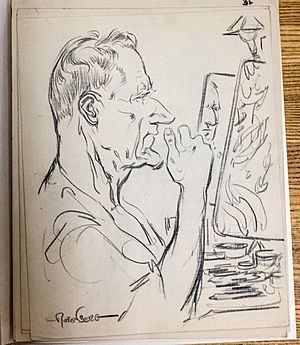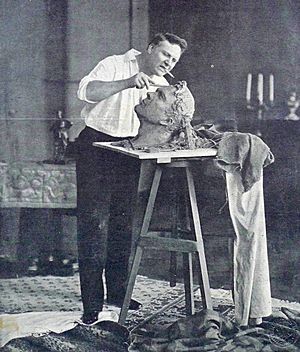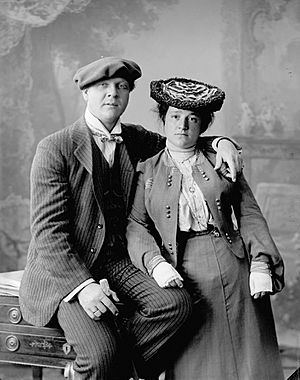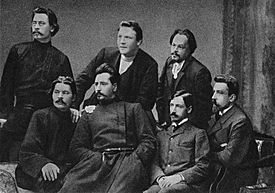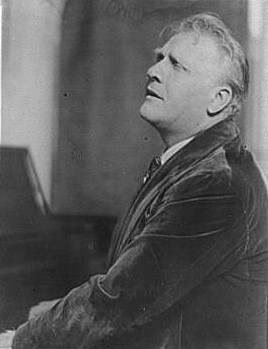Feodor Chaliapin facts for kids
Quick facts for kids
Feodor Ivanovich Chaliapin
|
|
|---|---|
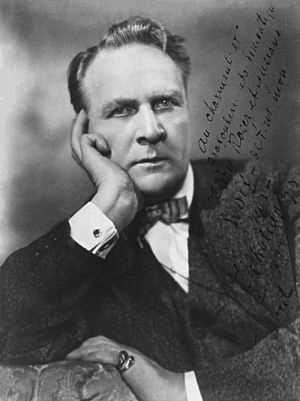
Feodor Ivanovich Chaliapin, 1930s
|
|
| Born |
Fyodor Ivanovich Shalyapin
13 February 1873 |
| Died | 12 April 1938 (aged 65) Paris, France
|
| Occupation | Opera singer |
| Years active | 1894–1938 |
| Spouse(s) | Iola Tornaghi Marina Petsold |
| Children | 9 including Boris and Feodor Jr., |
Feodor Ivanovich Chaliapin (Russian: Фёдор Ива́нович Шаля́пин, tr. Fyodor Ivanovich Shalyapin, IPA: [ˈfʲɵdər ɪˈvanəvʲɪtɕ ʂɐˈlʲapɪn]; February 13, 1873 – April 12, 1938) was a famous Russian opera singer. He had a very deep and powerful bass voice. He became well-known around the world, performing in major opera houses. Many people say he helped create a more realistic way of acting in opera.
Contents
Feodor Chaliapin's Early Life
Feodor Chaliapin was born on February 13, 1873, in Kazan, Russian Empire. His family was from the countryside. He was born in a part of a merchant's house. The next day, he was baptized in a church nearby. His family later moved to a smaller house in a village called Ametyevo.
Starting His Singing Career
Feodor Chaliapin's singing teacher was Dmitri Usatov. Chaliapin started his career in Tbilisi and at the Imperial Opera in Saint Petersburg in 1894. He was then asked to sing at the Mamontov Private Opera from 1896 to 1899. His first big role there was as Mephistopheles in Gounod's Faust, where he became very successful.
At Mamontov, Chaliapin met Sergei Rachmaninoff, a famous composer and conductor. They became lifelong friends. Rachmaninoff taught Chaliapin a lot about music. He insisted that Chaliapin learn not only his own parts but also all the other parts in the operas. With Rachmaninoff, Chaliapin learned the main role in Mussorgsky's Boris Godunov. This role became his most famous character.
Becoming a World-Famous Singer
Because of his success at Mamontov, the Bolshoi Theatre in Moscow hired Chaliapin. He sang there regularly from 1899 to 1914. During World War I, he also performed often at the Zimin Opera in Moscow.
From 1901, Chaliapin began to tour in other countries. He had a fantastic debut at La Scala in Italy that year. He sang as the devil in Boito's Mefistofele. The conductor was Arturo Toscanini, one of the greatest opera conductors. Toscanini later said that Chaliapin was the best opera talent he had ever worked with.
Chaliapin's first performance at the Metropolitan Opera in New York in 1907 was not as successful. His acting was very new and different for audiences at that time. But he returned to the Met in 1921 and sang there for eight seasons with great success. New York audiences had become more open-minded.
In 1913, Sergei Diaghilev, a famous organizer of arts events, introduced Chaliapin to London and Paris. Chaliapin then started giving solo concerts. He sang traditional Russian folk songs, like "The Song of the Volga Boatmen", which he made famous worldwide.
Later Years and Legacy
Chaliapin toured Australia in 1926, and his concerts were highly praised. After the Russian Revolution of 1917, Chaliapin faced difficulties. He was treated as a respected artist in Soviet Russia at first. However, life under the new government was hard, and his property was taken over. Because of this, he stayed outside Russia after 1921. He moved to Finland and then to France. Paris became his main home and where he passed away.
Chaliapin continued his international opera and concert career in England and the United States. In May 1931, he performed in London. His most famous role was Boris Godunov. He was also known for playing Ivan the Terrible in Rimsky-Korsakov's The Maid of Pskov, Mephistopheles in Gounod's Faust, and Don Quixote in Massenet's Don Quichotte.
Thanks to Chaliapin, many Russian operas became well-known in the West. These included Mussorgsky's Boris Godunov and Khovanshchina, Glinka's Ivan Susanin, and Borodin's Prince Igor.
In 1933, Chaliapin made a sound film called Don Quixote. He starred in three different versions of the film (French, English, and German). The film was based on the novel by Miguel de Cervantes, with music by Jacques Ibert.
In 1932, Chaliapin wrote a book about his life called Man and Mask: Forty Years in the Life of a Singer. While touring Japan in 1936, he had a toothache. A hotel chef created a special tender steak for him. This dish is still known as a Chaliapin steak in Japan today.
Chaliapin's last performance on stage was in 1937, as Boris, at the Opéra de Monte-Carlo. He died the next year in Paris from leukemia, at age 65. In 1984, his remains were moved from Paris to Moscow and re-buried in the Novodevichy Cemetery.
Feodor Chaliapin's Family Life
Chaliapin was married two times. His first wife was Italian ballerina Iola Tornaghi (1873–1965). They married in Russia in 1898 and had six children. Their children included Boris (1904–1979) and Feodor Jr. (1905–1992). Feodor Jr. became an actor in movies. Boris was a famous artist who painted portraits for many Time magazine covers.
While married to Iola, Chaliapin also lived with Marina Petsold (1882–1964). She was a widow with two children. They had three daughters together. Chaliapin's two families lived separately, one in Moscow and one in Saint Petersburg. Chaliapin married Marina in 1927 in Paris.
The Russian artist Konstantin Korovin painted Chaliapin's portrait many times. They became close friends after meeting in 1896.
Awards and Recognitions
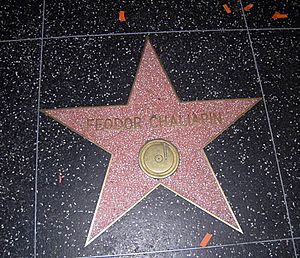
- 1902 – Order of the Golden Star of Bukhara, 3rd class
- 1907 – Golden Cross of the Prussian eagle
- 1910 – Soloist of His Majesty (Russia)
- 1912 – Soloist of His Majesty the King of Italy
- 1914 – British award for special achievements in the arts
- 1914 – Order of St. Stanislaus, 3rd class (Russia)
- 1918 – People's Artist of the Republic (The Soviet government later took away this title in 1927)
- 1934 – Commander of the Legion of Honour (France)
His Recordings
Chaliapin had a unique bass voice that recorded very well. He made many recordings for His Master's Voice. He started with early recordings in Russia and continued through the time when microphones were first used. Some of his performances in London were recorded live in the 1920s. His last recording, made in Tokyo in 1936, was of "The Song of the Volga Boatmen". Many of his recordings are available on CDs today.
What People Thought of His Art
- Opera expert Michael Scott said that Chaliapin is one of the three greatest singers and most important artists of the 20th century, along with Enrico Caruso and Maria Callas.
- The singer Geraldine Farrar said Chaliapin had a voice like "melodious thunder." But she also warned that he sometimes did unexpected things on stage to get all the attention. She said, "Chaliapin was a wonderful opera partner, but one had to be watchful for sudden changes from the rehearsal plan, and original touches that only helped Chaliapin."
Images for kids
-
Chaliapin as Mephisto. Photograph by Sergey Prokudin-Gorsky
-
Chaliapin as Boris Godunov
-
The belltower of the Epiphany (Bogoyavlenskaya) Church in Kazan. The Chaliapin Chamber Hall is located on the second floor of the belltower.
-
Portrait by Boris Kustodiev, 1921
See Also
 In Spanish: Fiódor Chaliapin para niños
In Spanish: Fiódor Chaliapin para niños
 | May Edward Chinn |
 | Rebecca Cole |
 | Alexa Canady |
 | Dorothy Lavinia Brown |


